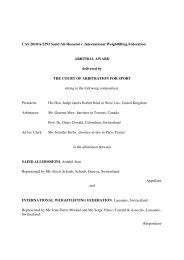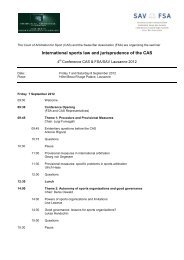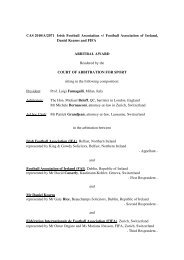(CAS) Bulletin - Tribunal Arbitral du Sport / TAS
(CAS) Bulletin - Tribunal Arbitral du Sport / TAS
(CAS) Bulletin - Tribunal Arbitral du Sport / TAS
You also want an ePaper? Increase the reach of your titles
YUMPU automatically turns print PDFs into web optimized ePapers that Google loves.
452.628/18 months = 25.146 EUR before tax, which after<br />
tax de<strong>du</strong>ction will be equal to EUR 21.166 net ”.<br />
It is thus clear that Shakhtar decided to apply the<br />
penalty foreseen in clause 7.1 of the Agreement<br />
against the future salaries of the Player, which in<br />
practice led to a very signifi cant re<strong>du</strong>ction of the<br />
Player’s monthly salaries.<br />
It is also noted that the Player repeatedly opposed<br />
to this salary re<strong>du</strong>ction, not only on the basis of the<br />
purported nullity of the clause providing for the<br />
penalty itself, but also on the basis of an alleged lack<br />
of legal or contractual grounds to re<strong>du</strong>ce the Player’s<br />
salary. For instance, in the Player’s representative<br />
letter of 19 May 2010 to the Club it is mentioned that<br />
“ even if the clause (7.1) was valid, there was no ground or<br />
provision for any de<strong>du</strong>ction of the player’s salaries ”. Therefore<br />
the fact of having remained in the Club from January<br />
to May 2010 (period of re<strong>du</strong>ction of salary) rendering<br />
his professional services shall not be understood as<br />
an unqualifi ed acceptance by the Player of the salary<br />
re<strong>du</strong>ction.<br />
The Club has alleged that under Swiss Law (which<br />
is applicable to this case on the basis of the grounds<br />
given above in this award), it was entitled to proceed in<br />
the way it did, mainly because articles 120 and 323.2b<br />
of the Swiss CO allow an employer to compensate<br />
employees’ salaries with the employer’s claim (such as<br />
the penalty stipulated in clause 7.1 of the Agreement).<br />
The Panel indeed agrees that in accordance with the<br />
referred legal provisions, compensation of employees’<br />
debts with salaries is feasible under Swiss Law.<br />
The compensation or “set-off ” of claims between<br />
an employer and an employee in an employment<br />
relationship is governed by the general provisions<br />
of art. 120 et seq. of the Swiss CO as well as by the<br />
specifi c provision of Art. 323b para. 2 of the Swiss<br />
CO, in accordance with the following principles and<br />
conditions (cf. TERCIER P., Le droit des obligations,<br />
4 th ed., Zurich 2009, n. 1520 et seq.; WYLER R., Droit<br />
<strong>du</strong> travail, 2nd ed., Bern 2008, p. 269; STAEHELIN/<br />
VISCHER, Zürcher Kommentar, Vol. V2c, Der<br />
Arbeitsvertrag, Art. 319-330a OR, 4th ed., Zurich<br />
2006, n 8 et seq. ad Art. 323b):<br />
- The reciprocity of claims: each party must be at<br />
the same time obligee and obligor of the other;<br />
- The similarity of the performances: the<br />
performances must be of the same kind (usually,<br />
monetary claims);<br />
- The setting-off counterclaim must be <strong>du</strong>e:<br />
although art. 120 para. 1 in fi ne Swiss CO seems<br />
to require that both claims be <strong>du</strong>e, Swiss scholars<br />
and case law admit that the claim to be set-off can<br />
be only likely to be performed;<br />
- The opportunity to claim the setting-off<br />
counterclaim in court: art. 120 para. 1 Swiss CO<br />
does not expressly set up this condition; however,<br />
it conveys the principle according to which a party<br />
shall not because of the set-off lose the benefi t of<br />
the defences (set-off is an objection, cf. ATF 63<br />
II 133, JdT 1937 I 566) that it could oppose to its<br />
obligee;<br />
- The absence of reasons of prohibition: set-off is<br />
not permitted if ruled out or limited (i) by law (art.<br />
125 CO, which refers to art. 323b para. 2 CO as<br />
one of the limitations), or (ii) by the agreement of<br />
the parties (art. 126 CO).<br />
- The declaration or expression of set-off: according<br />
to art. 124 para. 1 Swiss CO, the obligor (here: the<br />
employer) must demonstrate to the obligee that he<br />
wishes to take advantage of his right to set-off,<br />
either by express statement or by conclusive act<br />
(for instance by paying only the difference between<br />
the two debts). In other words, the expression<br />
of set-off is a unilateral act which, under Swiss<br />
law, does not have to comply with any formal<br />
requirements and can even result from conclusive<br />
act (cf. Swiss Federal <strong>Tribunal</strong>, Decision of 23<br />
March 2011, 4A_23/2011 at consid. 3.2, with<br />
further references; GAUCH P., Schweizerisches<br />
Obligationenrecht, Zurich, 2008, 9 th ed., n. 3248<br />
et seq.).<br />
Therefore, taking into consideration the above<br />
mentioned, it is correct to say that a set-off by the<br />
Club of a part of the salary with the Club’s claim<br />
against the Player because of the breach of clause 7.1<br />
of the Agreement is valid, unless it violates the limits<br />
permitted by Swiss law, in particular those set out in<br />
article 323b para. 2 of the Swiss CO.<br />
According to article 323b para. 2 of the Swiss CO,<br />
the salary of an employee may be set-off only to<br />
the extent that it can be the subject of attachment<br />
in debt enforcement proceedings. However, such<br />
quantitative limitation is not applicable, and an<br />
employer can set off its claims against the whole<br />
salary in case the employer is setting-off a claim<br />
resulting from damages imputable to the intentional<br />
miscon<strong>du</strong>ct of the employee.<br />
In brief, the salary may be set-off (i) for the part that is<br />
above the so-called minimum living wage and (ii) in<br />
full if the claim is for compensation of an intentional<br />
Jurisprudence majeure / Leading cases<br />
-<br />
81





